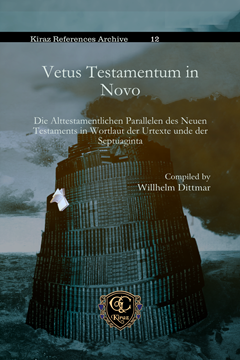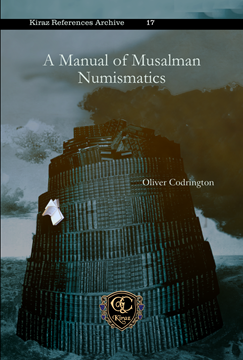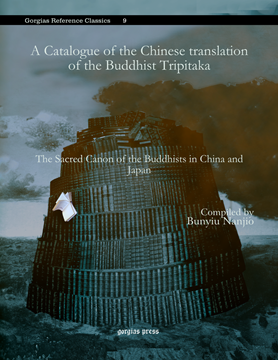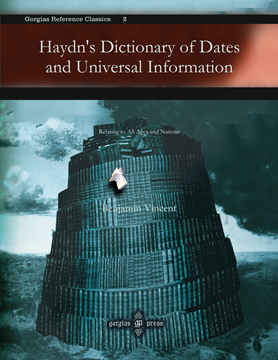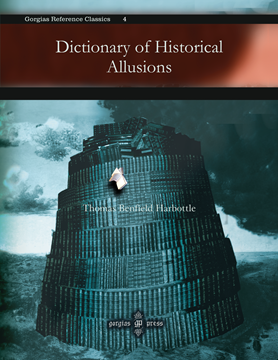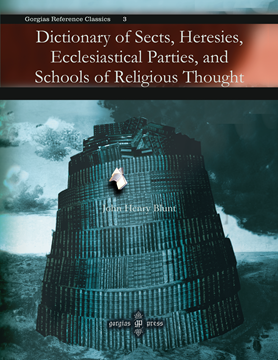Kiraz References Archive
Kiraz References Archive intends to keep valued reference works from the nineteenth century and earlier in circulation. This series will include reference works that have made an impact on the historical understanding of the present day, and which, despite their age, have continued to be utilized by scholars.
Vetus Testamentum in Novo
Die Alttestamentlichen Parallelen des Neuen Testaments in Wortlaut der Urtexte unde der Septuaginta
Compiled by Willhelm Dittmar
Series: Kiraz References Archive 12
ISBN: 978-1-61719-351-4
Willhelm Dittmar gives a complete list of the references to the Old Testament, the Apocrypha, and the Pseudepigrapha, including the Sibylline Oracles and the Apocalypse of Baruch.
$119.00 (USD)
A Manual of Musalman Numismatics
Series: Kiraz References Archive 17
ISBN: 978-1-61143-253-4
This book offers a convenient and comprehensive guide to Islamic coinage.
$178.00 (USD)
A Catalogue of the Chinese translation of the Buddhist Tripitaka
The Sacred Canon of the Buddhists in China and Japan
Compiled by Bunyiu Nanjio
Series: Kiraz References Archive 9
ISBN: 978-1-61719-053-7
This work is a list of the 1662 items in the Chinese version of the Tripitaka, the Theravada Buddhist scriptures.
$151.00 (USD)
Arabic Sources for Syriac Studies
By George Awwad
Series: Kiraz References Archive 5
ISBN: 978-1-60724-337-3
This comprehensive reference work provides bibliographical and manuscript data to Arabic works in the field of Syriac studies, both published and unpublished. The book contains over 2,000 subject and title entries.
$223.00 (USD)
Haydn's Dictionary of Dates and Universal Information
Relating to All Ages and Nations
Series: Kiraz References Archive 2
ISBN: 978-1-59333-797-1
This book was so popular during the lifetime of the original author that it went through six editions. This reprinting of the acclaimed seventeenth edition of Vincent’s revision of Haydn’s work is a delightful reminder of the basic information that was considered so important during the advent of the classic encyclopedias and reference works being produced in the nineteenth century. Arranged alphabetically, this historic work contains hundreds of articles that pertain to important dates and events in human history.
$281.00 (USD)
Dictionary of Historical Allusions
Series: Kiraz References Archive 4
ISBN: 978-1-59333-799-5
Useful for anyone interested in the social world of the nineteenth century, this dictionary was conceived as a desk reference to assist in finding, in a single source, the events behind the modern world. Intentionally without providing the length and depth of analysis of a standard history, this book provides in a brief paragraph the essentials of various historical references. Treaties, social and religious movements, battles, laws, and straightforward historical events are all chronicled alphabetically for ease of use.
$159.00 (USD)
Dictionary of Sects, Heresies, Ecclesiastical Parties, and Schools of Religious Thought
Series: Kiraz References Archive 3
ISBN: 978-1-59333-796-4
In an attempt to organize the swiftly-growing diversity in Christianity during the nineteenth century, the author compiled a learned compendium of the known religious groups of his day. A unique glimpse into the history of early-modern religious thought, this reference work includes extensive articles on the various collections of believers both Christian and non-Christian. Blunt, in a move that presaged the more comprehensive modern studies of the phenomenon of religious diversification, included exotic religions that were beginning to be taken seriously during his century.
$244.00 (USD)

